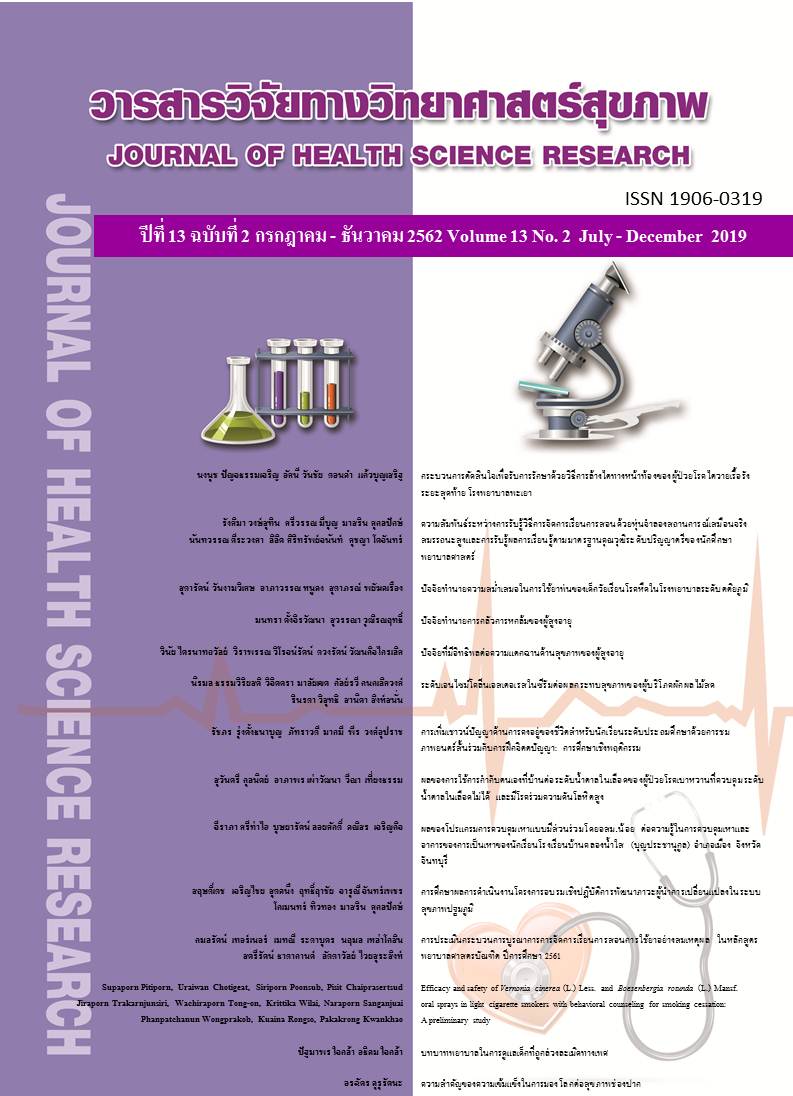การเพิ่มเชาวน์ปัญญาด้านการคงอยู่ของชีวิตสำหรับนักเรียนระดับประถมศึกษา ด้วยการชมภาพยนตร์สั้นร่วมกับการฝึกจิตตปัญญา: การศึกษาเชิงพฤติกรรม
Main Article Content
บทคัดย่อ
การศึกษานี้มีวัตถุประสงค์ เพื่อ 1) ออกแบบกิจกรรมการชมภาพยนตร์สั้นร่วมกับการฝึกจิตตปัญญา เพื่อเพิ่มเชาวน์ปัญญาด้านการคงอยู่ของชีวิต สำหรับนักเรียนระดับประถมศึกษา 2) สร้างแบบวัดเชาวน์ปัญญาด้านการคงอยู่ของชีวิต และ 3) ศึกษาผลการใช้กิจกรรมการชมภาพยนตร์สั้นร่วมกับการฝึกจิตตปัญญาต่อการเพิ่มเชาวน์ปัญญาด้านการคงอยู่ของชีวิต กลุ่มตัวอย่างเป็นอาสาสมัครนักเรียนชั้นประถมศึกษาปีที่ 5 โรงเรียนบรรหารวิทยา สังกัดสำนักงานเขตพื้นที่การศึกษาประถมศึกษาปราจีนบุรี เขต 2 ปีการศึกษา 2561 จำนวน 31 คน สุ่มเข้ากลุ่มทดลอง 4 กลุ่ม เครื่องมือที่ใช้ในการวิจัยประกอบด้วย 1) แบบกิจกรรมเพื่อเพิ่มเชาวน์ปัญญาด้านการคงอยู่ของชีวิต และ 2) แบบวัดเชาวน์ปัญญาด้านการคงอยู่ของชีวิต วิเคราะห์ข้อมูลโดยใช้สถิติ One-Way ANOVA
ผลการวิจัยพบว่า 1) กิจกรรมการชมภาพยนตร์สั้นร่วมกับการฝึกจิตตปัญญาสามารถเพิ่มเชาวน์ปัญญาด้านการคงอยู่ของชีวิต 2) แบบวัดเชาวน์ปัญญาด้านการคงอยู่ของชีวิต มีคุณภาพในการใช้เป็นเครื่องมือวัดเชาวน์ปัญญาด้านการคงอยู่ของชีวิต และ 3) เพศและลักษณะเชาวน์ปัญญาด้านการคงอยู่ของชีวิตหลังทำกิจกรรมการชมภาพยนตร์สั้นร่วมกับการฝึกจิตตปัญญา มีคะแนนเฉลี่ยเชาวน์ปัญญาด้านการคงอยู่ของชีวิตไม่แตกต่างกัน
Downloads
Article Details
บทความที่ได้รับการตีพิมพ์เป็นลิขสิทธิ์ของวิทยาลัยพยาบาลบรมราชชนนี จังหวัดนนทบุรี
ข้อความที่ปรากฏในบทความแต่ละเรื่องในวารสารวิชาการเล่มนี้เป็นความคิดเห็นส่วนตัวของผู้เขียนแต่ละท่านไม่เกี่ยวข้องกับวิทยาลัยพยาบาลบรมราชชนนี จังหวัดนนทบุรี และคณาจารย์ท่านอื่น ในวิทยาลัยฯ แต่อย่างใด ความรับผิดชอบองค์ประกอบทั้งหมดของบทความแต่ละเรื่องเป็นของผู้เขียนแต่ละท่าน หากมีความผิดพลาดใด ๆ ผู้เขียนแต่ละท่านจะรับผิดชอบบทความของตนเองแต่ผู้เดียว
เอกสารอ้างอิง
2. Ibnian KS, Hadban AD. Implications of multiple intelligences theory in ELT field. Int J Humanit Soc Sci. 2013;3(4):292-7.
3. Heidari F, Khorasaniha N. Delving into the relationship between LOC, MI, and reading proficiency. Journal of Language Teaching and Research. 2013;4(1):89-97.
4. Turner K, Rakkwamsuk S, Duangchai O. Health literacy of nursing students at Boromrajonani College of Nursing Chonburi. Journal of Health Science Research. 2018;12(1):1-9. (in Thai).
5. Biria R, Boshrabadi AM, Nikbakht E. The relationship between multiple intelligences and Iranian EFL learners’ level of L2 lexical knowledge: The case of gender. Advances in Language and Literary Studies. 2014;5(3):9-17.
6. Tirri K, Nokelainen P. Identification of multiple intelligences with the Multiple Intelligence Profiling Questionnaire III. Psychol Sci Q. 2008;50(2):206-21.
7. Altan MZ. Introducing the theory of multiple intelligences into English language teaching programs. Pamukkale University Journal of Education. 2012;32(2):57-64.
8. Şener S, Çokçalışkan A. An investigation between multiple intelligences and learning styles. J Educ Train Stud. 2018;6(2):125-32.
9. Emmiyati N, Rasyid MA, Rahman MA, Arsyad A, Dirawan GD. Multiple intelligences profiles of junior secondary school students in Indonesia. International Education Studies. 2014;7(11):103-10.
10. McClellan JA, Conti GJ. Identifying the multiple intelligences of your students. Journal of Adult Education. 2008;37(1):13-32.
11. Veale JF. Edinburgh handedness inventory - short form: A revised version based on confirmatory factor analysis. Laterality. 2014;19(2):164-77.
12. Allan BA, Shearer B. The scale for existential thinking. International Journal of Transpersonal Studies. 2012;31(1):21-37.
13. Hajhashemi K, Wong BE. A validation study of the Persian version of Mckenzie's multiple intelligences inventory to measure profiles of pre-university students. Pertanika Journal of Social Sciences & Humanities. 2010;18(2):343-55.
14. Naeini MB. Comparing the effects of two facets of multiple intelligences theory on developing EFL learners' listening. Advances in Language and Literary Studies. 2015;6(4):62-71.
15. Ignjatovic G. Multiple intelligences in ELP instruction in tertiary education: Integrated communicative MI-based activities in adult ELP/LE classrooms. Journal of Teaching English for Specific and Academic Purposes. 2017;5(3):567-87.
16. Shahzada G, Khan UA, Ghazi SR, Hayat Y. Gender differences in self-estimated multiple intelligences among secondary school students. Pakistan Journal of Psychological Research. 2015;30(1):81-94.
17. Malik GM, Akhter R. Existentialism and classroom practice. IOSR Journal of Humanities and Social Science. 2013;8(6) :87-91.


